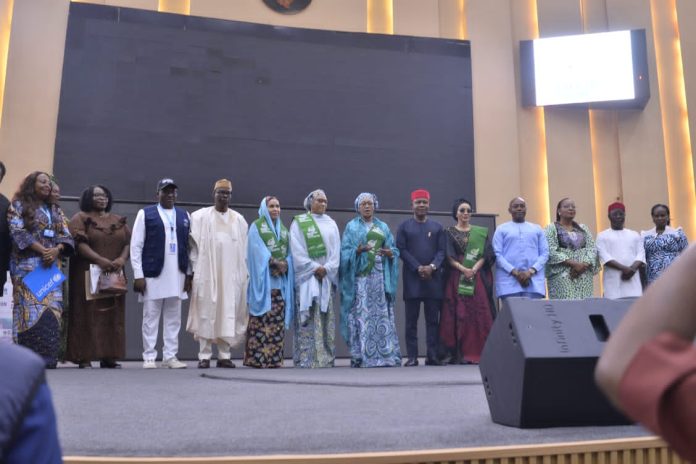The Federal Government has taken a major step toward eliminating HIV/AIDS and other infectious diseases in Nigeria with the launch of the ‘Free to Shine’ campaign in Enugu, targeting the South-East region. The campaign, led by the First Lady of Nigeria, Senator Oluremi Tinubu, CON, marks the final regional rollout of the initiative aimed at ending HIV/AIDS, Syphilis, and Hepatitis by 2030.
The campaign is part of a broader continental initiative under the Organization of African First Ladies for Development (OAFLAD) and the African Union, focusing on prevention, awareness, and healthcare access, especially among women and children.
“Nigeria bears the highest burden of HIV/AIDS in Sub-Saharan Africa,” said the First Lady. “This campaign aims to prevent new infections, stop mother-to-child transmission, and ensure that children born with HIV receive adequate treatment and care.”
She emphasized that the ‘Free to Shine’ campaign is aligned with President Bola Ahmed Tinubu’s Renewed Hope Agenda and called for deeper collaboration with community, religious, and traditional leaders to expand testing, counselling, and treatment.
Recent data from the Federal Ministry of Health shows that in 2024 alone, over 100,000 children and nearly 2 million adults were living with HIV in Nigeria. Many HIV-positive mothers do not test their infants early due to limited awareness, resulting in preventable child deaths.
The First Lady also championed the Triple Elimination initiative, which targets the simultaneous eradication of HIV/AIDS, Syphilis, and Hepatitis—diseases she said contribute to miscarriages, stillbirths, liver complications, and high infant mortality when untreated.
She praised the efforts of frontline health workers, national agencies such as NACA and NASCP, and international partners including WHO, UNAIDS, UNICEF, UNDP, PEPFAR, and EGPAF, for their ongoing support.
In a heartfelt message to the youth, she said, “You are the most vulnerable, but also our greatest hope. Please protect yourselves.”
Minister of State for Health and Social Welfare, Dr. Iziaq Adekunle Salako, hailed the First Lady as Nigeria’s “Chief Public Health Champion,” crediting her for mobilizing support and raising awareness across the country.
“Your leadership sends a strong message: HIV, Hepatitis, and Syphilis are preventable and treatable. These are no longer death sentences,” Salako said.
He highlighted Nigeria’s multi-pronged approach to tackling the diseases, including:
Prevention of mother-to-child transmission (PMTCT)
Voluntary Medical Male Circumcision (VMMC)
Access to Pre- and Post-Exposure Prophylaxis (PrEP/PEP)
Expanded testing and treatment for sexually transmitted infections (STIs)
According to him, 1.7 million Nigerians are currently receiving antiretroviral therapy (ART), and the federal government has made budgetary provisions to ensure consistent drug availability. Efforts are also ongoing to integrate HIV care into national health insurance schemes.
New data from NASCP suggests a steady decline in new HIV infections and vertical transmission rates, with expectations of a sharper reduction by the end of 2025.
However, Dr. Salako stressed the need for greater state-level action. “We urge state governments to increase domestic funding, absorb trained health workers, and reduce dependency on dwindling donor support.”
In a compelling message to Nigerian youth, he added: “The best prevention for HIV and STIs is a cup of water—not before, not after, but instead of sex.”
The ‘Free to Shine’ campaign, under the Renewed Hope Initiative, will continue to drive national momentum around public health, sexual health education, and disease prevention. With strong political will and sustained community engagement, Nigeria remains on course to achieve the UNAIDS 95-95-95 targets by 2030.

